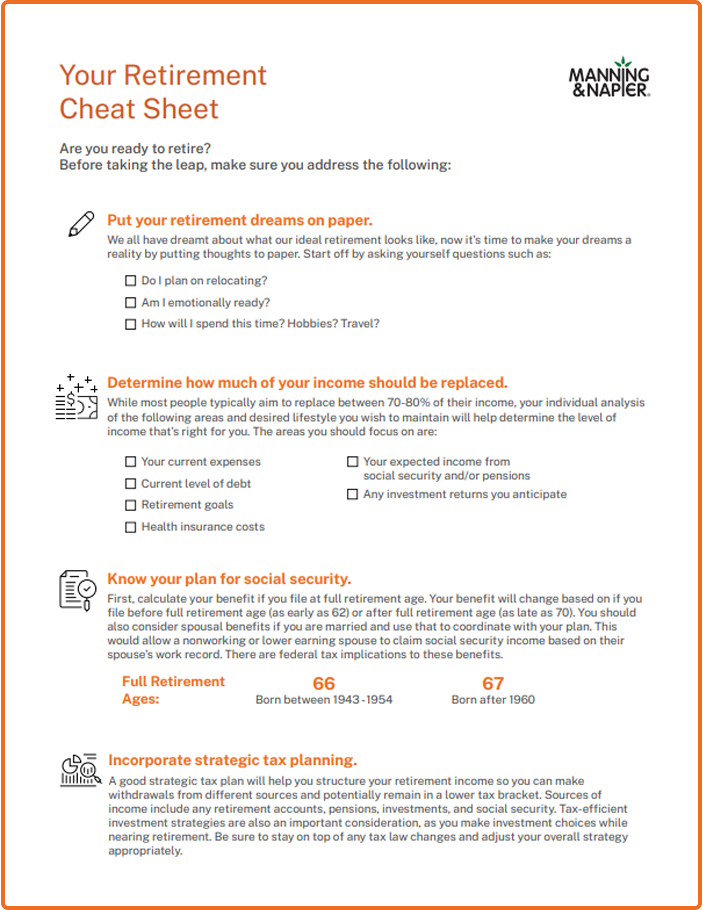How to Deal with Burnout Close to Retirement
It’s not always clear when the exact right time to retire is. When you compile the feelings of work burnout and stress, a sooner retirement can look even more appealing. Of course, there are financial, emotional, and psychological aspects to consider before transitioning into retirement.
We can help
Is retirement on your horizon? A financial advisor can help ensure you're able to retire when you want, and maintain financial freedom. Schedule a call today to determine how much you need to retire comfortably and stay retired, plan ahead for taxes, create an estate plan, and more.
Connect with usWhen it comes to our retirement, we all tend to get hyper-focused on the numbers behind it – Am I at an age where I can retire comfortably? Do I have enough saved? How will I replace my income? However, when it comes to job burnout and retirement, it’s equally important to consider the emotional and psychological factors intertwined in going from decades of working and scheduled days to decades of relaxation and free time.
Overcoming burnout before retirement is two-fold. First, addressing it will help both your mental and physical well-being by prioritizing taking care of yourself to recoup and finish your career on a positive note. Second, it will help ease your overall transition into retirement.
Let’s better understand burnout and discuss practical tips and strategies for balancing it and prioritizing your well-being during your pre-retirement era.

Retirement Planning Cheat Sheet
No matter what your retirement timeline is, planning early can help ease the transition. Our Retirement Cheat Sheet is full of helpful tips and to-dos to help you get started and ensure you’re on track to live the retirement you've been dreaming of.
Download the cheat sheetUnderstanding Burnout
Work-related burnout is a state of physical or emotional exhaustion that involves a sense of reduced accomplishment and loss of personal identity, according to the Mayo Clinic.
Being in such a state can impact your physical and mental health. Understand if you’re feeling burnout by noticing symptoms such as chronic fatigue, decreased motivation, and a lack of enjoyment while asking questions such as:
- Have you become cynical or critical at work?
- Do you lack the energy to be consistently productive?
- Do you lack satisfaction from your achievements?
Burnout is something everyone can experience throughout their career as stress, long hours, and the pressure of personal expectations all weigh on us. These feelings are understandably magnified when the retirement finish line is in view but just out of reach. To help navigate these feelings, check in with yourself with self-reflection exercises to assess your own mental, emotional, and physical well-being, honestly. Seeking professional guidance is another option to help overcome the burnout and place you on the right path to finish your career and ease into retirement.
In the meantime, evaluate your work commitments and consider reducing hours or responsibilities gradually to relieve yourself from the tasks causing you stress. Work with your team to prioritize and delegate tasks to avoid becoming overwhelmed. And finally, seek support from colleagues or mentors who are in similar positions to alleviate the burden and gain fresh perspectives.
It’s also a good time to revisit your retirement plan. Take the time to reflect on your personal goals and aspirations for retirement. Keep in mind that retirement is a time for self-discovery, exploration, and relaxation. Embrace this flexibility when setting your goals. Plan to take the trip you’ve always wanted or explore hobbies you’ve never had the time for. The possibilities are endless, especially when you’ve overcome the burnout and are open to new routines and opportunities.
Addressing Burnout Before Retirement
Burnout can have a significant impact on retirement, potentially making the transition and the overall experience more difficult. Here are several ways in which burnout can affect retirement and techniques for overcoming these hurdles:
- Reduced Enjoyment: Experiencing burnout can leave you feeling emotionally and physically exhausted. This can dampen your ability to find joy and fulfillment in retirement activities and hobbies, hindering the overall enjoyment of this phase.
- Health Consequences: Prolonged burnout can have adverse effects on physical health, potentially leading to chronic conditions or exacerbating existing ones. Poor health can limit individuals' ability to engage in activities and pursuits they had hoped to enjoy during retirement. Focus on establishing a regular exercise routine to improve energy levels and overall health, practice stress-management techniques – such as meditation, mindfulness, or deep breathing exercises – and engage in hobbies, leisure activities, or social interactions to promote a sense of fulfillment and rejuvenation.
- Relationship Strain: Burnout can take a toll on personal relationships. The stress and exhaustion associated with burnout can create tension and conflict with loved ones, impacting the quality of relationships during retirement. Invest time and effort into your relationships while communicating your needs, boundaries, and expectations of your retirement.
- Loss of Purpose: Burnout often stems from a lack of motivation or fulfillment in work. When individuals retire without addressing burnout, they may find themselves grappling with a sense of purposelessness or a void that their previous career filled. This can lead to feelings of emptiness or dissatisfaction.
- Financial Implications: Burnout can impact financial planning for retirement. If burnout leads to decreased job performance or the need to retire earlier than anticipated, it can affect one's financial preparedness for retirement. Financial stress can further exacerbate burnout and reduce overall well-being during this phase. Review your financial and retirement plan with your financial advisor before making any decisions.
- Difficulty Adjusting: Burnout can make it challenging to transition from a highly structured work environment to a more open-ended retirement lifestyle. The sudden lack of routine and sense of identity can be disorienting and increase feelings of restlessness or unease.
- Missed Opportunities: If burnout is not addressed before retirement, individuals may miss out on the potential benefits and opportunities that retirement can offer. They may be less inclined to pursue new interests, explore passions, or engage in activities that promote personal growth and fulfillment.
Although burnout is common, that doesn’t mean we should ignore it or hope that it resolves itself. When you’re preparing for retirement on top of it all, understand that the emotions and psychological aspects of burnout can bleed into what should be an exciting next phase of your life. Keep these tips in mind if you find yourself battling burnout.
On-Demand Webinar
Smart Retirement Strategies for High-Earning Professionals
Trading in your 9 to 5 for retirement takes strategic planning – especially during your final, high-earning years, which are crucial for building the savings you’ll rely on for decades to come. Watch now to discover smart retirement strategies and gain the confidence you need to step into your next chapter.
Watch nowSource: Mayo Clinic.
Please consult with an attorney or a tax or financial advisor regarding your specific legal, tax, estate planning, or financial situation. The information in this article is not intended as legal or tax advice.



